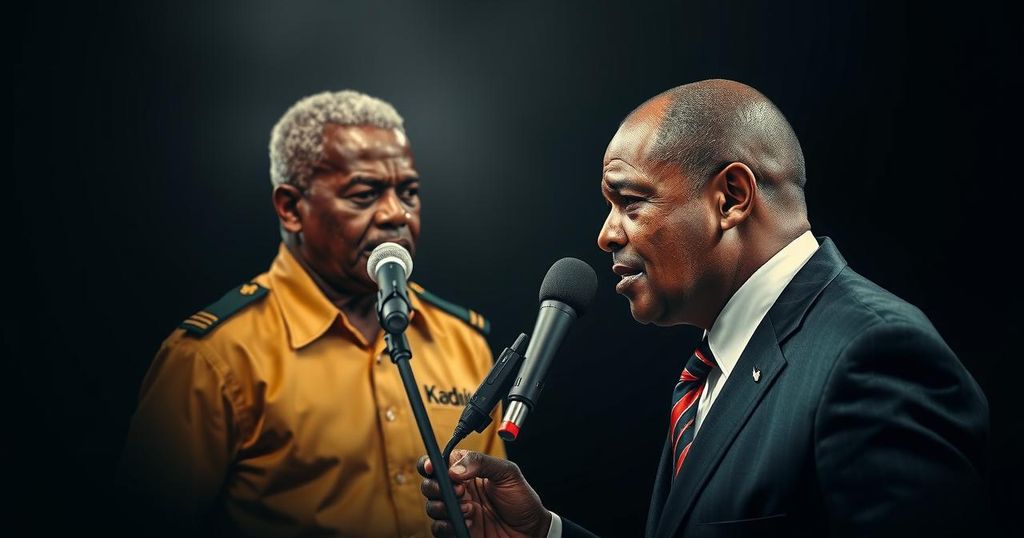Zimbabwe Accused of Interfering in Neighbouring Elections
Zimbabwe’s ruling party, Zanu-PF, faces allegations of electoral interference in neighboring countries, including Botswana, Namibia, and Mozambique, amid claims of regional manipulation to support friendly ruling parties. As tensions escalate, opposition leaders call for action against perceived transgressions, while Zimbabwean officials deny involvement. The complex historical ties among liberation movements in the region further complicate the situation, raising concerns about the integrity of democracy in Southern Africa.
Zimbabwe’s ruling party, Zanu-PF, has come under fire for allegedly meddling in the electoral processes of neighboring countries, particularly Botswana, Namibia, and Mozambique. These allegations arise from Zimbabwe’s close affiliations with the ruling parties in these nations, prompting opposition groups to accuse Zanu-PF of interference in their local elections. Zanu-PF, a prominent liberation movement in Southern Africa, purports to be confronting neocolonial forces that it claims are attempting to reassert their influence in the region. Ahead of Mozambique’s contested elections on October 9, Zanu-PF dispatched campaign teams to assist the Front for the Liberation of Mozambique (Frelimo) and its new president, Daniel Chapo. Additionally, Frelimo was granted the opportunity to hold campaigns within Zimbabwe to appeal to nationals living abroad. Numerous Zimbabweans reportedly took advantage of Mozambique’s diaspora voting provisions, signaling a potential direct involvement in foreign elections. In Botswana, officials from Zanu-PF have been seen campaigning alongside the ruling party, the Botswana Democratic Party (BDP), ahead of elections scheduled for October 30. In Namibia, opposition protests erupted against a South African firm tasked with producing ballot papers for the upcoming elections, spurred by purported connections to Zimbabwe’s President Emmerson Mnangagwa. Earlier this year, Zanu-PF convened a meeting of allied liberation parties within the Southern African Development Community (SADC), asserting the need to unify against threats from historical colonial powers. While most of the regional parties abstained from Zimbabwe’s contentious August 2023 elections, Zanu-PF’s presence has remained palpable in its neighbors’ political landscapes, exacerbating allegations of interference. Former President of Botswana, Ian Khama, has been particularly vocal against these alleged transgressions, stating at a recent rally, “We just learnt that members of Zanu-PF voted in the just ended Mozambique general elections.” He highlighted President Mnangagwa’s prior commitments to support President Masisi’s electoral campaign, warning of possible election manipulations by utilizing Zimbabwean votes in Botswana. Opposition leader Job Sikhala reiterated demands for SADC action against Zanu-PF, describing the party’s regional actions as desperate and intrusive into sovereign affairs. In contrast, Zimbabwe’s government spokesperson, Nick Mangwana, vigorously refuted claims of election interference, insisting that Zimbabwe only engages with democratically elected governments and operates within the framework of SADC election observation missions, while dismissing allegations that Zimbabwe orchestrates governance in the region. Tensions have escalated internationally as Zimbabwe previously accused Zambian President Hakainde Hichilema of interference during the August elections, an event followed by diplomatic disputes that included formal complaints to the African Union and SADC regarding Zimbabwe’s behavior. The situation culminated in President Mnangagwa inadvertently highlighting security concerns regarding Zambia in a leaked conversation with Russian President Vladimir Putin. Zimbabwe’s interference claims have further intensified following Mnangagwa’s premature congratulatory message to Frelimo for their electoral success in Mozambique, raising alarms among opposition parties alleging electoral fraud. As the current SADC chair, Zimbabwe faces increasing pressure to mediate between conflicting factions in the region, amidst warnings of undermining democratic processes. Recent commentators, like Piers Pigou from the Institute of Security Studies, have labeled Mnangagwa’s actions as a blatant violation of electoral protocols, emphasizing the growing concerns regarding election integrity in the region.
The political landscape in Southern Africa has been volatile, characterized by a legacy of liberation struggles and the complex relationships between former liberation movements. Zanu-PF of Zimbabwe is among the few remaining liberation parties still in power and has maintained close ties with similar parties across the region, particularly in Botswana, Namibia, and Mozambique. These relationships have often resulted in allegations of interference in neighboring countries’ electoral processes, as ruling parties seek to bolster their influence at the expense of democratic practices. The Southern African Development Community (SADC) serves as a regional bloc intended to promote peace, democracy, and development. However, claims against Zanu-PF reveal tensions between maintaining sovereignty and the pressure of historical alliances, thus complicating democratic progress in the region. Opposition parties in these neighboring nations are increasingly vocal against perceived external manipulation, highlighting the fragility of democratic institutions within the context of regional dynamics.
In conclusion, Zimbabwe’s Zanu-PF stands accused of interfering in the electoral processes of neighboring countries, raising serious concerns about regional governance and democratic integrity. Accusations from various opposition movements in Botswana, Namibia, and Mozambique illuminate the potential ramifications of historical affiliations between ruling parties. As allegations mount, both the Zimbabwean government and regional leaders must navigate the turbulent waters of diplomacy, national sovereignty, and accountability in a bid to uphold democratic principles across Southern Africa.
Original Source: www.theeastafrican.co.ke




Post Comment